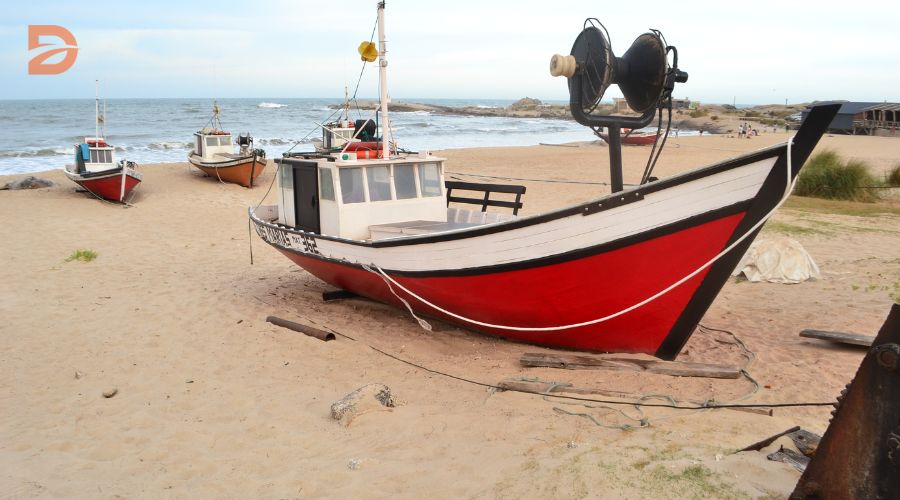Are you eager to embark on a nautical adventure by acquiring your own boat, but feeling overwhelmed by the purchasing process? Fear not, as this comprehensive guide is designed to equip you with the essential boat-buying tips every new owner should know. Whether you’re dreaming of sailing the open seas or cruising down serene inland waterways, this article will provide you with the insights and strategies to make an informed decision and find the perfect vessel to suit your needs and budget.
Key Takeaways
- Determine the right boat type and size to match your intended use and lifestyle
- Set a realistic budget and explore financing options, weighing the pros and cons of new vs. pre-owned boats
- Research boats online and visit dealerships to find the best fit, conducting thorough inspections and sea trials
- Understand the additional costs beyond the list price, including insurance, registration, and storage
- Choose the right storage option based on your location and seasonal weather conditions
- Negotiate the deal and complete marine surveys to ensure a smooth and successful purchase
- Familiarize yourself with boating safety and handling through educational resources like the Boater’s Handbook
Determine the Right Boat Type
When it comes to choosing the right boat, it’s essential to consider your specific needs and requirements. The type of boat you select will largely depend on the activities you plan to enjoy, the number of people you’ll regularly have on board, and the waterways you intend to explore. By carefully evaluating these factors, you can ensure you find a vessel that meets your boat ownership considerations and provides an exceptional on-the-water experience.
Consider Your Needs
Start by reflecting on the primary use of your boat. Are you an avid angler looking to target bass and other freshwater species? A bass boat might be the perfect choice. Perhaps you’re interested in water sports like wakeboarding or tubing; in that case, a ski boat or deck boat could be the way to go. For those seeking a versatile platform for fishing, sailing, and cruising, a cuddy cabin or pontoon boat might be the ideal option.
Evaluate Boat Size Requirements
- Offshore fishing boats typically measure 30 ft. or more, while inshore fishing boats are around 15-20 ft.
- Cruising boats range from 20-30 ft, while water sports boats are generally 15-25 ft.
- Boat sizes can vary significantly based on the specific activities you plan to enjoy, such as freshwater fishing, saltwater fishing, watersports, sailing, day cruising, or overnight cruising.
By carefully considering your needs and evaluating the appropriate boat size, you’ll be well on your way to finding the perfect vessel to suit your boat ownership considerations and [https://drivefaq.com/must-have-tools-for-easy-car-cleaning-maintenance/]ensure a memorable time on the water.
| Boat Type | Description | Typical Size |
|---|---|---|
| Bass Boat | Designed for catching bass and other panfish in freshwater | 15-20 ft |
| Bowrider | Can hold 6-10 passengers, smaller than deck boats | 20-25 ft |
| Center Console | Suitable for offshore sports fishing | 20-30 ft |
| Cuddy Cabin | Versatile, suitable for fishing, sailing, cruising, and water sports | 20-30 ft |
| Cruiser | Provides accommodation for passengers, with amenities similar to yachts but on a smaller scale | 20-30 ft |
| Deck Boat | Open deck area for seating, great for water sports | 15-25 ft |
| Fishing Boat | Designed for fishing activities, with options for freshwater and offshore environments | 15-30 ft |
| Performance Boat | Known for speed and adrenaline-inducing experiences | 20-30 ft |
| Pontoon Boat | Popular inland water boats, offering ample deck space for socializing | 18-30 ft |
| Ski Boat | Ideal for water skiing due to their ability to create a minimal wake | 18-22 ft |
| Yacht | Luxurious boats typically used for leisure and entertainment | 30+ ft |
Set a Realistic Budget
Establishing a realistic budget is a crucial step in the boat-buying process. While a brand-new boat offers the advantage of factory freshness and a warranty, a pre-owned craft may allow you to stretch your budget further. If financing is an option, explore alternatives such as dealer-arranged loans, bank financing, or specialized marine lending programs.
Weigh New vs. Pre-Owned Options
When calculating your budget, be sure to factor in additional costs beyond the purchase price, including insurance, registration, maintenance, and storage. Include a contingency amount of at least 20% for unforeseen circumstances. Also, consider expenses for boat shows, sales visits, and any necessary inspections or surveys.
Explore Financing Alternatives
Boat loans typically require a down payment, usually ranging from 10% to 20% of the boat’s purchase price. However, qualified buyers can currently access a boat loan with no down payment through BayFirst. Boat loans feature fixed interest rates and repayment terms, which borrowers must adhere to over the loan duration.
The loan application process involves submitting an application, along with financial documents, for a loan officer’s review. Upon approval, borrowers receive a loan offer detailing the interest rate, loan duration, and monthly payment amount. After accepting the offer, borrowers finalize the paperwork and complete the loan closing process for funds disbursement.
Whether you choose a new or pre-owned boat, maintaining financial discipline throughout the buying process is crucial to avoid overspending and potential regret. By setting a realistic budget and exploring financing options, you can navigate the boat-buying journey with confidence.
Start Shopping for Your Boat
Once you have a clear idea of the boat type and budget, it’s time to start the shopping process. Begin by researching boats online, and exploring manufacturer websites, online reviews, and forums to familiarize yourself with different models and their features.
But don’t rely solely on the internet. Visiting local boat dealerships can provide valuable hands-on experience and allow you to compare boats and dealers in person. Talking to friends or acquaintances with similar boats can also offer valuable firsthand insights.
Research Boats Online
Conducting thorough online research is an essential first step in the boat-buying process. Explore manufacturer websites to learn about the various models, their specifications, and key features. Dive into online forums and reviews to get a sense of real-world experiences from current boat owners.
- Familiarize yourself with different boat types, sizes, and designs
- Understand the features and capabilities of various models
- Read honest reviews and feedback from other boating enthusiasts
Visit Boat Dealerships
While online research is valuable, nothing beats the hands-on experience of visiting local boat dealerships. This allows you to see the boats in person, get a feel for the size and layout, and compare different models side by side.
- Speak with knowledgeable sales representatives to ask questions and get personalized recommendations
- Explore the dealer’s inventory and take the time to inspect the boats thoroughly
- Arrange for test drives, if possible, to get a true sense of the boat’s handling and performance
By combining online research and in-person visits to boat dealerships, you’ll be well on your way to finding the perfect boat to suit your needs and budget.
Boat buying tips
Inspect the Boat Thoroughly
When you’ve narrowed down your search and are seriously considering a particular boat, it’s crucial to conduct a thorough inspection. Examine the engine, propeller, bilge, steering system, electrical components, and fuel tank to ensure everything is in good working order. Pay close attention to signs of wear and tear, such as rips in the upholstery or deck carpet, which can indicate the need for costly repairs.
Conduct Sea Trials
In addition to the thorough inspection, be sure to take the boat for a sea trial. This will allow you to evaluate its performance under various conditions, such as with a full complement of family and friends on board. During the sea trial, observe the boat’s handling, acceleration, and overall responsiveness to ensure it meets your expectations.
When inspecting the boat and conducting sea trials, keep an eye out for signs of decay or rot, particularly in the stringers and transom of larger boats. These issues can be costly to repair and may be a deal-breaker if not addressed properly.
By thoroughly inspecting the boat and taking it for a comprehensive sea trial, you can make an informed decision and ensure that the boat you purchase is a perfect fit for your needs and budget.
Understand Additional Costs
Purchasing a boat is an exciting milestone, but it’s important to be aware of the additional costs that come with boat ownership. Beyond the initial purchase price, there are several expenses you’ll need to factor in, from insurance and registration to ongoing maintenance and storage.
Factor in Insurance and Registration
One of the first steps in preparing for boat ownership is researching the insurance requirements in your area. Boat insurance can vary widely in cost, depending on factors such as the size, age, and intended use of your vessel. Premiums typically range from 1% to 3% of the boat’s value, with higher costs in hurricane-prone regions. Additionally, you’ll need to familiarize yourself with the boat registration process, as this is a necessary step before you can legally operate your boat.
According to recent statistics, the sales tax on boats can vary by state, with Florida capping sales tax on boats at $18,000, which corresponds to 7.5% of the boat price of $300,000. Furthermore, hull coverage in hurricane-prone areas can cost around 5% of the boat’s value, equating to approximately $15,000 per year.
Additional Costs to Consider
In addition to insurance and registration, there are several other costs associated with boat ownership that you’ll need to budget for, including:
- Pre-purchase surveys – A typical survey for a catamaran in the Florida Keys can cost around $35 per foot, with additional costs for surveys and haul-out.
- Upgrades and modifications – Transitioning a boat to be a cruising vessel could involve investments in equipment like a larger solar array, increased battery capacity, and a watermaker, amounting to around $20,000.
- Maintenance and repairs – Boat maintenance costs are estimated to be approximately 5-10% of the value of the boat per year, ranging from $16,000 to $32,000 for a $320,000 boat.
- Storage and mooring – Marinas and storage facilities can charge anywhere from a hundred dollars to a thousand dollars per month for mooring or storage, calculated per foot of the vessel.
- Fuel, oil, and other operating costs – Boats typically consume 8 to 12 gallons of fuel per hour of operation, with higher costs at marinas compared to regular filling stations.
By understanding these additional costs upfront, you can better prepare for the financial responsibilities of boat ownership and ensure a smooth and enjoyable boating experience.
Choose the Right Storage Option
When it comes to boat ownership, choosing the right storage option is a crucial decision. After investing in your vessel, you want to ensure it is properly protected and maintained. Boat storage options can vary widely, from in-water slips to outdoor dry docking and indoor dry stacking facilities. Each option has its own advantages and considerations to weigh.
Dry outdoor boat storage tends to be a more popular and less expensive option for boat owners compared to indoor storage facilities. The cost of boat storage can range from a couple of hundred dollars for outdoor storage to thousands of dollars for indoor storage, depending on the location and boat size. Dry boat storage is considered an ideal option due to its ability to protect the boat from weathering and extend its lifespan significantly.
In regions with harsh winters, most boat owners opt for dry boat storage during the off-season to protect their vessels. The cost of winter boat storage can vary depending on the region and boat size, typically ranging from $50 to $200 per foot of a boat for indoor storage and $20 to $50 per foot for outdoor storage per season.
Indoor boat storage offers the most protection and helps maintain the highest resale value for vessels. Dry stacked storage keeps boats protected inside a warehouse, with facilities storing multiple boats at a time and utilizing forklifts for removal and replacement. Rack system storage is another popular choice among boat owners, providing safe and affordable options for boat storage.
When selecting a boat storage option, consider factors such as location, indoor or outdoor storage, flexibility of lease agreements, available amenities, and the overall safety and security of the facility. By carefully evaluating your boat storage options, you can ensure your vessel is well-protected and ready for your next adventure on the water.
Finalize the Purchase
As you approach the final stages of the boat-buying process, it’s time to negotiate the deal and complete any necessary marine surveys. While the list price and features of the boat are important, there may be additional costs to consider, such as dealer fees, accessories, and delivery. By negotiating the boat deal effectively, you can ensure that you get the best possible price and value for your investment.
Negotiate the Deal
When negotiating the boat deal, be prepared to discuss the following factors:
- The initial list price of the boat
- Any dealer fees or additional charges
- The cost of any accessories or upgrades you’d like to include
- Delivery and transportation expenses
Remember, there is often room for negotiation, especially with pre-owned boats. By being a savvy negotiator, you can potentially secure a better deal and save money on the overall purchase.
Complete Marine Surveys
Before finalizing the purchase, it’s crucial to engage the services of an independent marine surveyor to thoroughly inspect the boat. They will provide a comprehensive assessment of the vessel’s condition, identifying any potential issues or areas of concern. This step can help you complete the marine surveys and negotiate the final price accordingly.
| Key Factors Assessed by Marine Surveyors | Importance |
|---|---|
| Hull Condition | Ensures the structural integrity of the boat |
| Engine and Mechanical Systems | Evaluates the performance and reliability of the boat’s powertrain |
| Electrical and Navigation Systems | Verifies the functionality of the boat’s onboard electronics and instrumentation |
| Safety Equipment | Ensures the boat is equipped with all necessary safety gear |
By completing the marine surveys and addressing any identified issues, you can have peace of mind knowing that your boat is in good condition and worth the purchase price.
Conclusion
Purchasing a boat is a significant investment, but with the right preparation and knowledge, it can be a rewarding and enjoyable experience. By following the boat buying tips outlined in this guide, you’ll be well-equipped to navigate the purchasing process, make informed decisions, and find the perfect vessel to suit your needs and budget. Remember to prioritize your safety, research thoroughly, and enjoy the freedom and adventure that comes with boat ownership.
As you embark on your boat-buying journey, keep in mind that the type of boat you choose should align with your specific needs and preferences. Whether you’re interested in a bass boat for fishing, a bowrider for water sports, or a cruiser for family adventures, the key is to carefully evaluate your requirements and explore the various options available.
Additionally, be mindful of the financial aspects involved, including the upfront cost, ongoing maintenance, and any necessary storage or insurance considerations. By setting a realistic budget and understanding the various financing options, you can ensure a smooth and stress-free purchasing process.
FAQ
What factors should I consider when determining the right boat type for my needs?
When choosing the right boat type, consider the number of people you’ll regularly have on board, whether you’ll be towing the boat, the specific waterways you plan to use it on, and the available storage space or size constraints.
How can I establish a realistic budget for buying a boat?
Evaluate the pros and cons of buying a new boat versus a pre-owned one, and explore financing options such as dealer-arranged loans, bank loans, or specialized marine financing. Be sure to factor in additional costs beyond the purchase price, including insurance, registration, maintenance, and storage.
How can I effectively research and shop for boats?
Start by conducting online research, and exploring manufacturer websites, online reviews, and forums to familiarize yourself with different models and their features. Additionally, visit local boat dealerships to gain hands-on experience and compare boats and dealers in person.
What should I look for when inspecting a boat before purchase?
Thoroughly examine the engine, propeller, bilge, steering system, electrical components, and fuel tank to ensure everything is in good working order. Additionally, take the boat for a sea trial to evaluate its performance under various conditions.
What additional costs should I consider beyond the boat’s purchase price?
Be sure to factor in insurance and registration requirements in your area, as well as ongoing maintenance and storage costs. Researching these expenses can help you make a more informed decision and budget accordingly.
What are the key considerations when choosing a boat storage option?
Evaluate your options, which may include in-water storage, outdoor dry docking, or indoor dry docking, considering factors such as cost, convenience, and the level of protection your boat will receive.
What steps should I take when finalizing the purchase of a boat?
Be prepared to negotiate the deal and complete any necessary marine surveys. Engage the services of an independent marine surveyor to thoroughly inspect the boat and provide a comprehensive assessment of its condition.










